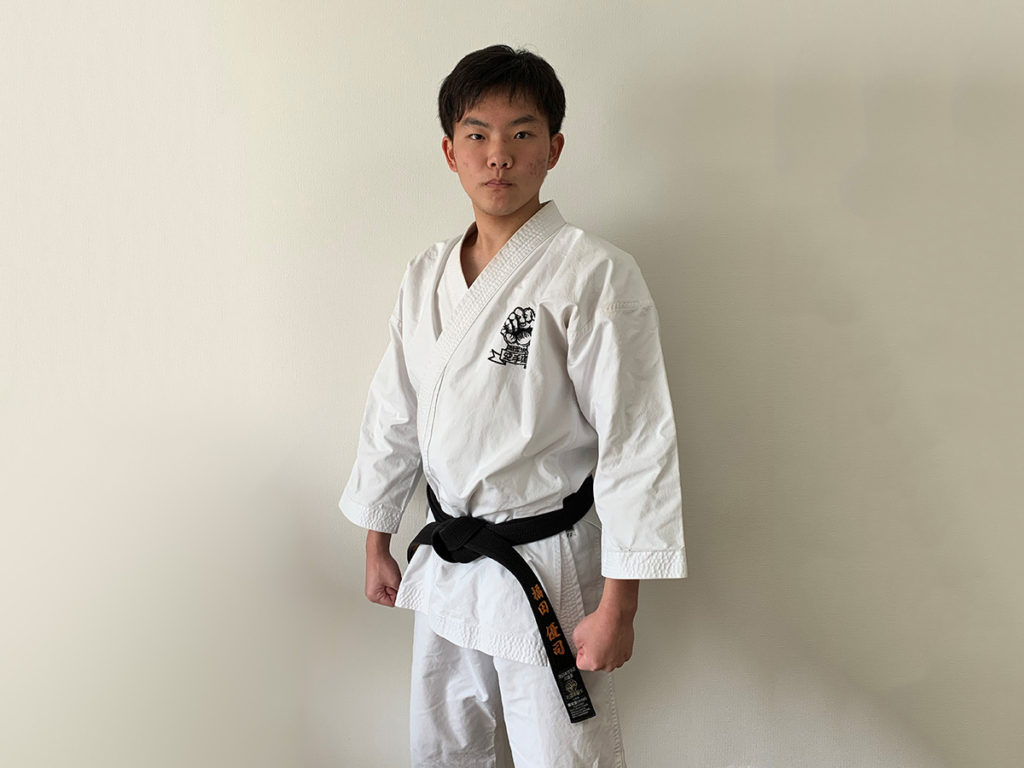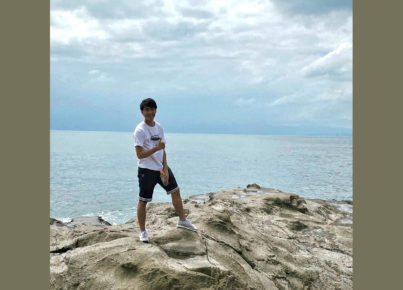“What to reinvent and what to maintain in the post Covid-19 world”
Yushi Fukuda
High School student
Japan
Today I had my Karate lesson right here in my room using “ZOOM”, which is now an essential app of our lives. The online training began in June, and I’m still not used to moving my body without striking the wall or doing gentle movements quietly. The troublesome virus “Covid-19” required us plenty of these changes in our livings. I had believed that everything would return to normal in few months, but many predictions say that the situation won’t improve for several years leaving the world fundamentally changed lifestyles. I now do agree that we need to a transformation to a post Covid-19 world, but I assume that transportation is not always the correct answer in some terms. Experiencing the harshest period with extreme restrictions, what I found were not only points that must be reinvented, but also things we should maintain however the world’s situation is.
As we can see from the restrictions coming back in the world, if the pandemic won’t settle down and the situation goes back and forward, we might have to endure the strong regulations once more. We can’t deny the possibility of a new virus arising as well. Considering these matters, the world is now moving toward a society which is strong against epidemics all the time. This new society requests us various shifts in our actions and ways of thinking as well. Among all these points of reformation, the biggest change we need to make is to decrease contacts between people. To carry this out what people began is to operate everything “online”. The words “telework” or “remote something” were used so frequently as the society began to cope with the virus, and these online activities are likely to become a standard in the future. I experienced so many online activities as the wave of digitalization came around me, such as my Karate lesson or my school which was conducted online during the first term. However, what I strongly felt through these online works was the importance of connection between people brough by face-to-face communication.
When our school was closed and we began to quarantine, the world around me became obviously narrow. As most of the conversation I had through my daily life were cut off and I was not stepping out of my house for long, I had less material to feel interest in and less chance to express myself. This situation didn’t change so much even if the online school began, because most classes concluded in myself. I still had far less communication than usual, especially these ordinary chats with others. It’s a quite stressing thing not having enough connection with others or facing everything through the computer display, and this would be a big issue of the online society. To avoid this stressing full online life, what I expect the world after Covid-19 is to classify what can be done online, and what should be done face-to-face. Currently, we are trying to do everything on internet when we can’t go out, and we return to the normal face-to-face style when the situations are better. In short, online is an emergency measure for now. However, there are various things that can be done completely online rather we are in an emergency or not. On the other hand, there are things that can’t be concluded online, such as creating new relationships with others or telling our strong feelings like passion. These things which bring us satisfactions or unity with others, should be maintained as possible as we can, even if the situations are at the worst. We should sort our daily activities in to these two groups, and look for a way to maintain face-to-face communication, while we introduce online methods as everyday use, not as an alternative for emergency.
By the way, these online classes made me remember the final presentation we made in TYCA. What we spoke was exactly about education, and we suggested that education would be the most significant element to create a sustainable world. Watching the world during this disaster, I became confident that this was true. In May I heard a shocking news about people dying in Africa, because of methanol poisoning. What they did was to drink methanol hearing that it has a good affect to protect themselves from Covid-19. This wouldn’t have happened if people had basic knowledge by receiving education.
I found faults or our plan as well. Our group’s plan was to use virtual classrooms to provide education all over the world including poor people. When we discussed about the plan, the biggest issue we found was how to distribute online surroundings to people around the world. During the quarantine, this problem happened not only in developing countries but even in Tokyo. There was a big disparity in the education level between schools that could provide good online systems and the schools that couldn’t, or students who had a good Internet environment in their houses and the ones who even didn’t have an online device at home. Providing online surroundings all over the world would be far more difficult than we imagined. In the new world after the pandemic, we would rely more on technology, which means the differential between the richest people and the poorest people would be easier to expand. This matter would raise the importance to provide good education to everyone. I expect the current world leaders to tackle this “how to provide education” problem first to create a sustainable post-Covid-19 world. The importance of equal education is permanent even if the world completely changes.
The final point I want to mention is the other great arrangement made in the world, which is the blockades of country borders and the decrees of international traffic. This is causing divisions between countries and races, represented by the conflict between China and the United States. It’s a disappointing fact that Asian people were discriminated, because some thought that Asian people had a high possibility to carry the virus. Though there is a risk of the virus being brought in, I believe that we must maintain international exchange of people to stabilize the world. A country shutting itself up is not what we want in the new coming global community. These are some of the points I felt that would be important to remain through the creation of the post Covid-19 world. There is nothing better than not having such a disaster, but since we are facing a turning point of the world, we should consider it as a chance. In the process of constructing new lifestyles, it is clear that we must adopt new technologies especially online tools, but at the same time we must not forget the importance of face-to-face connection between people. The world is supported by strong association of people both in small scales like our families, and in a big scale which I mean the world supported by the connection of countries. I expect the current global leaders to show a good path of the new world development, and I would like to contribute to realizing the ideal post Covid-19 world, as a next-generation leader.
今日は、今では生活に欠かせないアプリとなった「ZOOM」を使って、この部屋で空手のレッスンを受けました。6月から始まったオンライントレーニングですが、壁を叩かずに体を動かしたり、静かに穏やかな動きをすることにはまだ慣れません。厄介なウイルス「Covid-19」は、私たちの生活様式を大きく変化させました。私はすべてのものが数ヶ月で正常に戻ると信じていましたが、多くの予測では、状況は数年間は改善されないだろうということです。また、元に戻るのではなく、生活様式が根本的に変わった状態のままである、という予測もされています。私は、我々はCovid-19後の世界へ適応していくための変化が必要だ、という意見に賛成です。しかし、ある場面においては、変わるということが必ずしも正解であるとは思えないのです。極限の制約の中で最も過酷な時を経験したことで、改革すべき点だけでなく、世界の状況がどうであっても維持すべき点が見えてきました。
世界中で、Covid-19に関わる規制が再度敷かれていることからも分かるように、パンデミックが落ち着かずに状況が前進と後退を繰り返すと、より強力な規制に再度耐えなければならなくなるかもしれません。新たなウイルスが発生する可能性も否定できません。そう考えると、世界は今、常に感染症蔓延に強い社会へと向かっていると言えるでしょう。この新しい社会は、私たちの行動や考え方にも様々な変革を求めています。その中でも最も大きな変化は、人と人との接点を減らすことです。これを実行するために人々が始めたことは、すべてを「オンライン」で運用することです。「テレワーク」や「リモート何とか」という言葉は、社会がウイルスに対応し始めた頃から頻繁に使われるようになりましたが、今後はこのようなオンライン活動がスタンダードになっていくでしょう。私の周りにもデジタル化の波が押し寄せてきて、空手の授業や、1学期にオンラインで行っていた学校の授業など、多くのオンライン活動を経験しました。しかし、これらのオンライン活動を通して強く感じたのは、対面でのコミュニケーションによる人と人とのつながりの大切さでした。
学校が閉鎖され、隔離され始めた時、私の周りの世界は明らかに狭くなりました。日常生活で会話をほとんどしなくなり、家の外に出る回数も減りました。興味が感じられることや、自分を表現する機会も少なくなりました。オンライン授業が始まっても、ほとんどの授業が自分の中で完結していたので、状況はそれほど変わりませんでした。普段よりもコミュニケーションの機会は依然として減っており、特に人との普通のおしゃべりが圧倒的に少なくなっていました。人とのつながりを十分に感じられないことや、パソコンの画面を通してすべてに向き合わなければならないのは、かなりのストレスです。そして、これらはネット社会の大きな問題点だと思います。こういったストレスを軽減させるためにCovid-19以降の世界では、オンラインでできることと、対面でやるべきことが分類されて欲しいと思います。現状では、外に出られない時はネットで何でもやろうとし、状況が良くなったら通常の対面スタイルに戻るという流れになっています。要するに、今のところネットは緊急対策ということになります。しかし、緊急時かどうかに関係なく、完全にネットでできることはいろいろあります。一方で、新しい人間関係を築いたり、情熱的に強い気持ちを伝えたり、オンラインでは完結できないこともあります。私たちに満足感や一体感をもたらしてくれることは、最悪の状況であっても、できる限り対面での活動を維持していくべきです。私たちの日常の活動をこの2つに分類し、対面でのコミュニケーションを維持する方法を模索しながら、オンラインの方法を緊急時の代替手段としてではなく、日常的なものとして導入していくことが必要だと思います。
ところで、オンライン授業のことを考えていると、TYCAでの最後の発表を思い出しました。私たちが話したことは、まさに教育についてのことでした。私たちは、持続可能な世界を作るためには教育が最も重要な要素であるという考えをお伝えしました。世界的なコロナウィルス蔓延というニュースを見ていて、私たちの提案は本当だと確信しました。5月には、アフリカでメタノール中毒が原因で人々が死んでいるという衝撃的なニュースを耳にしました。彼らは、Covid-19から身を守るためにメタノールを飲むと効果があると聞いたので、実際に飲んでしまったようです。教育を受けて基礎的な知識を持っていれば、こんなことにはならなかったでしょう。
私たちの発表した計画にも欠点を見つけました。私たちのグループの計画は、バーチャル教室を使って、貧しい人たちを含む世界中の人々に教育を提供するというものでした。その計画について話し合ったときに、一番の問題は、オンライン環境をどうやって世界中の人に整備するかということでした。隔離中、この問題は発展途上国だけでなく、東京でも起こりました。ネット環境が整っている学校とそうでない学校、あるいは自宅にネット環境が整っている生徒とそうでない生徒とでは、教育レベルに大きな格差がありました。世界中にネット環境を提供することは、私たちが想像していた以上に難しいことでした。パンデミック後の新しい世界では、テクノロジーへの依存度が高まり、富裕層と貧困層の差が拡大しやすくなります。このことは、すべての人に良い教育を提供することの重要性を高めることになります。私は、現在の世界の指導者たちが、持続可能なCovid-19後の世界を作るために、まずこの「教育をどう提供するか」という問題に取り組むことを期待しています。例え世界が完全に変わったとしても、平等な教育の重要性は永続的なものです。
最後に申し上げたいのは、世界で行われているもう一つの大きな取り決めについてです。それは国境封鎖と国際的渡航制限です。これは、中国とアメリカの対立に代表されるように、国や民族間の分裂を引き起こしています。アジア人がウイルスを持っている可能性が高いと思っていた人もいたことが、アジア人差別に繋がっていたのは残念な事実です。ウイルスが持ち込まれる危険性はありますが、世界を安定させるためには国際的な人の交流を維持していかなければならないと思います。ある国が鎖国状態に陥ることは、これからの新しい国際社会に求められていることではありません。
以上が、Covid-19後の世界を作る中で残しておくべきポイントだと感じました。このような災害が起こらないに越したことはありませんが、世界が転換期を迎えていることを、チャンスと考えるべきでしょう。新しいライフスタイルを構築していく過程で、オンラインツールを中心とした新しいテクノロジーを取り入れなければならないことは明らかです。しかし同時に、人と人との顔の見えるつながりの重要性も忘れてはなりません。世界は、家族のような小さなスケールでも、国のつながりに支えられた大きなスケールでも、人と人との強いつながりによって支えられています。現在の世界のリーダーたちが、新しい世界の発展の道筋を示してくれることを期待し、次世代のリーダーとして、Covid-19後の理想的な世界の実現に貢献していきたいと思います。








